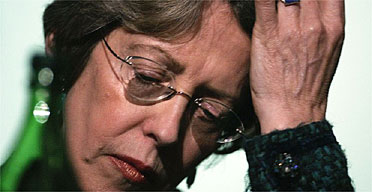
At least 13 members of Tony Blair's ministerial team have campaigned over the last few months against closure of services at NHS hospitals used by their constituents, a Guardian survey has revealed.
The hitherto unrealised scale of opposition within the government's ranks to the consequences of NHS reform reflects the difficulty Patricia Hewitt, the health secretary, faces in selling her policies to the nation. Many Labour backbenchers are also showing their dissent by making campaigns to save accident and emergency departments or maternity services the focus of their constituency activities.
Members of the government mounting recent campaigns on NHS issues in their constituencies are spread widely across Whitehall, with jobs in the Home Office, Ministry of Defence, the law officers' department, the whips' office, the Labour party's high command and the departments of culture, constitutional affairs, communities and local government, work and pensions, and trade and industry. They even include two members of Ms Hewitt's Department of Health team.
The trend was first disclosed in the Guardian last month in a report on Hazel Blears, the Labour party chair, who joined picket lines in the week before Christmas to protest at a decision to close the maternity unit at Hope hospital in her Salford seat. Other ministers who were quickly identified as critics of NHS changes in their backyards included John Reid, the home secretary, who backed protests against the loss of A&E services at Monklands hospital in his Airdrie and Shotts constituency. Tessa Jowell, the culture secretary, and Harriet Harman, the constitutional affairs minister, objected to the closure of a 24-hour emergency clinic at the Maudsley hospital, near their south London seats.
Jacqui Smith, the chief whip responsible for enforcing party discipline, campaigned actively against the loss of maternity services at the Alexandra hospital in her Redditch constituency. Others involved in local protests included Phil Woolas, the communities and local government minister, and Ivan Lewis, a health minister, who is objecting to a decision to close the maternity unit at Fairfield hospital in his Bury constituency.
Mike O'Brien, the solicitor-general, who challenged proposals to close a special care baby unit at George Eliot hospital in Nuneaton, was another dissenter. Derek Twigg, the defence minister, voiced concern about the impact of ward closures at Halton hospital. Joan Ryan, the immigration minister, supported a campaign to save emergency and children's services at Chase Farm hospital which serves her Enfield North constituency. James Plaskitt, the work and pensions minister, is fighting to save the full range of services at Warwick hospital, which are rumoured to be under threat of downgrading.
Dissent has also come from two parliamentary private secretaries, on the bottom rung of the government's promotional ladder. Kitty Ussher, a former special adviser to Ms Hewitt, is a PPS at the DTI. She led a vociferous campaign last year to save the A&E department at Burnley hospital. On her website she says: "It is the biggest thing I have worked on since becoming the town's MP."
Mary Creagh, MP for Wakefield, was appointed in September as PPS to Andy Burnham, the health minister, after an outspoken campaign against the loss of maternity services at Huddersfield Royal Infirmary. Mr Burnham got the job in May after the resignation of Jane Kennedy, who cited damage being done to children's services in Liverpool as a reason for quitting. Iain Wright, MP for Hartlepool, resigned in September as parliamentary private secretary to the health minister Rosie Winterton, complaining about a decision he said threatened the long-term viability of the town's hospital.
The list of dissenters is likely to grow this year as health authorities publish plans to reconfigure services and begin consultations on which hospitals will lose departments. The government's aim is to concentrate specialist services in fewer, better-equipped hospitals and carry out more routine medical work in clinics closer to people's homes.
Ms Hewitt has not asked her ministerial colleagues to refrain from dissent before opportunities for appeal against closures and downgradings have been exhausted. "But when decisions are decisions, there will come a point when colleagues need to get behind the solution," the source said.

